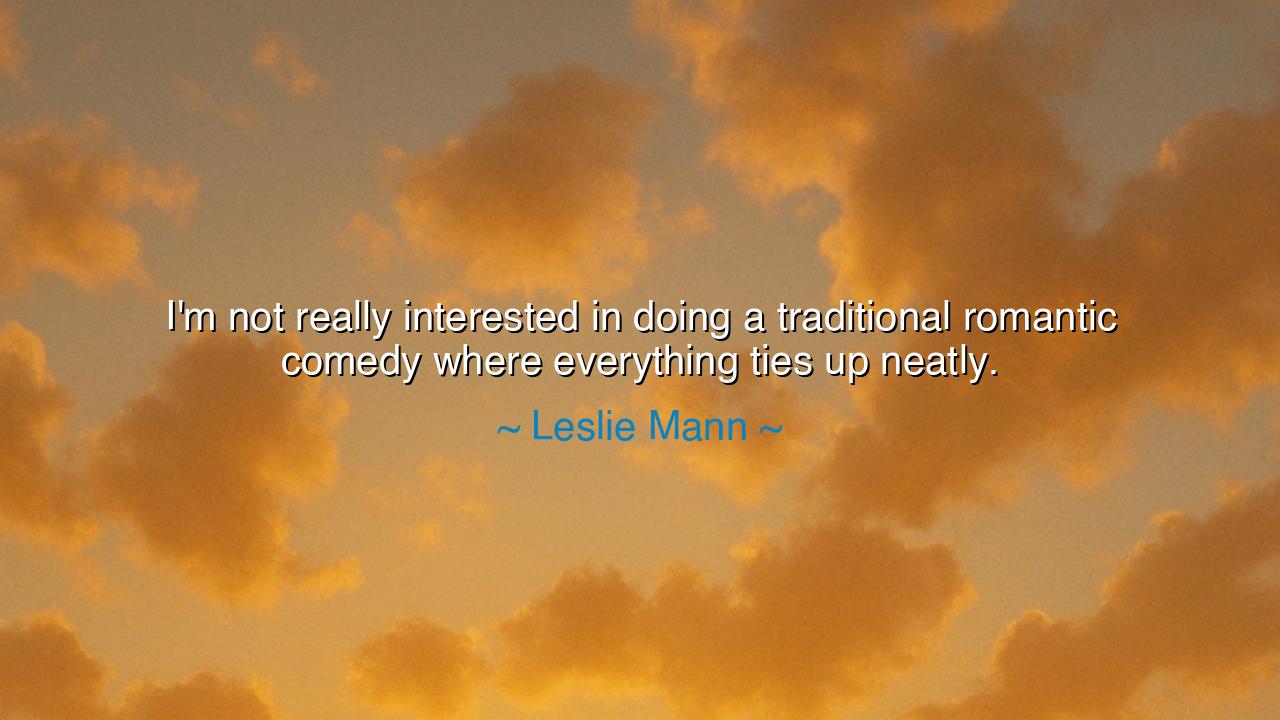
I'm not really interested in doing a traditional romantic comedy
I'm not really interested in doing a traditional romantic comedy where everything ties up neatly.






The words of Leslie Mann—“I’m not really interested in doing a traditional romantic comedy where everything ties up neatly”—are a challenge, a declaration, and a whisper of truth all at once. In them, we hear the voice of an artist who does not wish to dwell in illusion, but in authenticity. For the traditional romantic comedy, with its predictable arcs and tidy endings, comforts the audience with fantasy—but Mann’s spirit longs for the untamed, the unpredictable, the raw texture of real life where joy and sorrow, love and struggle, often remain unresolved.
The origin of this sentiment lies in humanity’s timeless struggle between myth and reality. From the ancient epics to modern cinema, storytellers have often sought to console listeners with endings that resolve the chaos of life, granting harmony where the world denies it. Yet alongside those tales stand others—tragic, uncertain, incomplete—that reflect life as it truly is. Sophocles did not let Oedipus walk away unscarred. Shakespeare did not tie up Hamlet in sweetness and light. And in our own time, Mann declares that she is not drawn to the artifice of resolution, but to the honesty of imperfection.
Consider the story of Anton Chekhov, the Russian playwright, who filled his works with longing, with half-lived dreams, with endings that faded into silence rather than applause. His characters loved, failed, hoped, and yearned—but rarely did they “tie up neatly.” And yet, because of that, his stories carried truth. They touched audiences not with fantasy but with recognition. This is the tradition into which Mann places herself: the tradition of the unvarnished, where comedy is laced with pain, and romance is marked by the fragility of the human condition.
Her resistance to the neat ending is not cynicism but courage. For to present life in all its disorder requires bravery. It is easy to soothe with tales where every couple finds their match, every problem dissolves, and every heart is healed. Harder is it to show the cracks in love, the enduring questions, the ambiguities that never vanish. Yet such stories, though uncomfortable, carry power. They tell us that our struggles are not failures, but part of the eternal human journey.
The lesson here is luminous: life does not always tie up neatly, and that is not a tragedy, but a truth. To seek only perfect conclusions is to set oneself up for despair. To embrace the messy, the unresolved, the unfinished, is to live with freedom. Love may not always conquer all. Friendships may falter. Dreams may bend but not break. And yet, in the midst of such uncertainty, life retains its beauty, its humor, and its sacred worth.
Practically, this means we must shift our expectations of our own stories. Do not demand that every chapter of your life end with closure and triumph. Accept that some stories will remain open-ended, that some loves will not resolve, that some journeys will wind without conclusion. Rather than seeing this as failure, see it as the mark of a life that is truly lived, in all its rawness and depth.
Thus, Mann’s words become a teaching for generations: do not crave only the tidy ending—embrace the real one. For reality, though messy, is rich with meaning. The untidy love, the unfinished dream, the unresolved path—all these are not lesser stories, but truer ones. And in truth, there is a beauty that no perfection can equal.
So let this wisdom endure: life is not a traditional romantic comedy, nor should it be. It is a story still unfolding, full of loose threads and wild turns. Cherish its incompleteness, and in doing so, you will discover that the greatest beauty lies not in what is neatly tied, but in what is passionately, imperfectly, and honestly lived.






AAdministratorAdministrator
Welcome, honored guests. Please leave a comment, we will respond soon